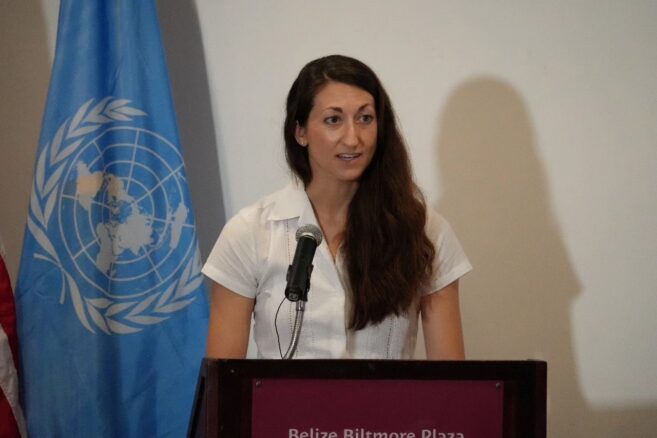Press Release, Belize City – The InfoSegura Regional Project, implemented by the United Nations Development Program (UNDP) in alliance with the United States Agency for International Development (USAID), joined the Ministry of Home Affairs and New Growth Industries and the U.S. Embassy to hold a forum on gender-based and domestic violence, highlighting the services and resources available to women and girls, youth, and persons exposed to violence in Belize.
The forum included participants from the United Nations Population Fund, the Ministry of Human Development, Families and Indigenous Peoples’ Affairs, the Ministry of Health and Wellness, the Magistracy, the Forensics Department, the Belize Police Department, and support groups including victims of domestic violence, to address the alarming rise of gender-based violence especially among women and girls through a shared and unified approach.
“Domestic abuse encompasses all behaviors intended to exert authority and control over the victim, not just physical ones,” said Hon. Kareem Musa, Minister of Home Affairs and New Growth Industries. “It primarily targets a spouse, partner, or close family member and can impact people from various walks of life. The major effects of domestic abuse are shown on people’s overall health and wellness. Because it results in physical harm, anxiety, and depression. Additionally, it deteriorates social skills and raises the risk that they’ll engage in health-harming behaviors like substance addiction or self-harm. Therefore, forums such as these that spread awareness and provide information on support resources available is important for us to jointly fight domestic violence and provide victims with as much information as possible.”
According to InfoSegura data, in Central America and the Dominican Republic, 9 out of 10 victims of sexual crimes are women and girls who face a greater risk of sexual violence and other types of violence in private as well as public spaces, such as on transportation and in the workplace.
“Gender-based violence not only affects the direct victims but goes beyond to affecting their families and the wider community and economy,” said Ian King, UNDP’s Deputy Resident Representative in Belize. “Initiatives like the InfoSegura Project use data and statistics to reflect real-life situations and to help governments and countries like Belize make evidence-based decisions and policies, but to do so it must be a collaborative and whole-of-society approach. This forum brings together different sectors and institutions to expand coordination and advocacy ensuring gender is incorporated into citizen security policies and actions.”
“The United States, through USAID’s InfoSegura Project, has supported the Central American countries and the Dominican Republic during the past 10 years highlighting the importance of using evidence-based data to make policy decisions while providing information on resources available to victims of gender-based and domestic violence,” said Sydney Skov, Political Officer at the U.S. Embassy Belize.
The InfoSegura Project supports the Belize Crime Observatory to enhance the knowledge, capacities and lessons of institutions that specialize in citizen security and justice and to implement the 2030 Sustainable Development Agenda specifically through Sustainable Development Goal (SDG) 5 of achieving gender equality, SDG 16 for peace, justice and strong institutions, and SDG 17 of partnerships for goals.
Gender-based and Domestic Violence Forum Raises Awareness of Support Services for Victims

Share
Read more

